Have a question? 06 70 73 89 02
🔞 Not for sale to under 18s
🌱 -20% with code FRENCHDOO 😁
Have a question? 06 70 73 89 02
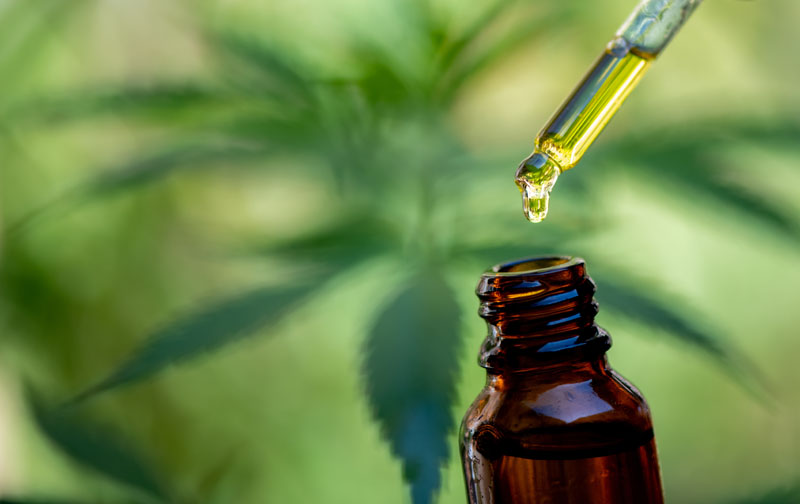
Choosing your CBD oil without doing your homework is no easy task. We've put together this guide to help you choose your oil according to your profile and budget.
CBD isolates contain only the CBD molecule and none of these other beneficial full-spectrum ("whole plant") CBD compounds.
To extract the CBD isolate: the other cannabinoids, terpenes and flavonoids found in the hemp plant are extracted and refined, using an industrial process of simultaneous heating and rotation called chromatography[1].
A widespread misconception is that, since CBD is pure and therefore more concentrated, it must have greater therapeutic potential. This is not the case. We'll address this point in the full-spectrum CBD section.
Broad-spectrum CBD oil contains all the cannabinoidsterpenes and other beneficial plant compounds, but no THC*. This type of refining is also carried out using the industrial chromatography process[1].
Advantage: Broad-spectrum CBD may be useful for people likely to be subject to anti-doping tests, such as athletes during competition periods. In this case, there would be no risk, given the absence of THC.
Disadvantage: A potential problem with broad-spectrum CBD oils is that some unscrupulous companies use not the whole plant but CBD isolate (CBD powder) as a base, and add isolated terpenes. With such a process, the effects of these oils would be far less than with the use of the whole plant.
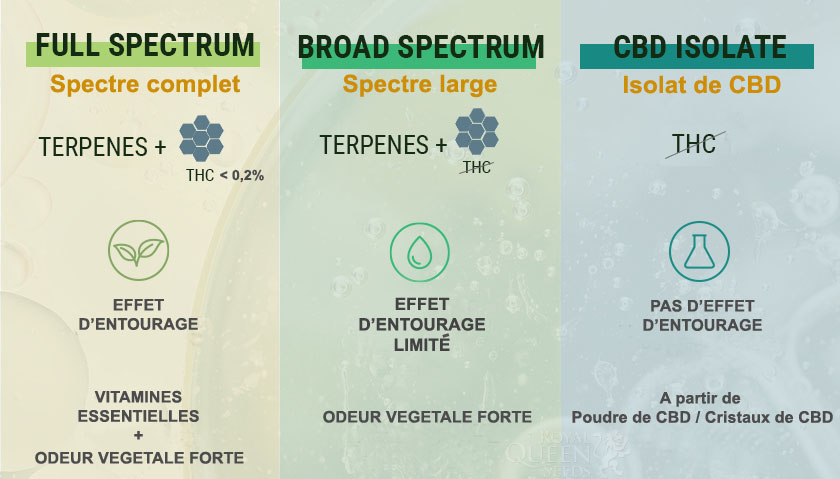
Full-spectrum CBD oils contain all the substances found in hemp.
These include :
Definitions :
> Terpenes are aromatic molecules naturally produced by plants.
> Flavonoids are substances of the polyphenol family, renowned for their antioxidant properties. [2]
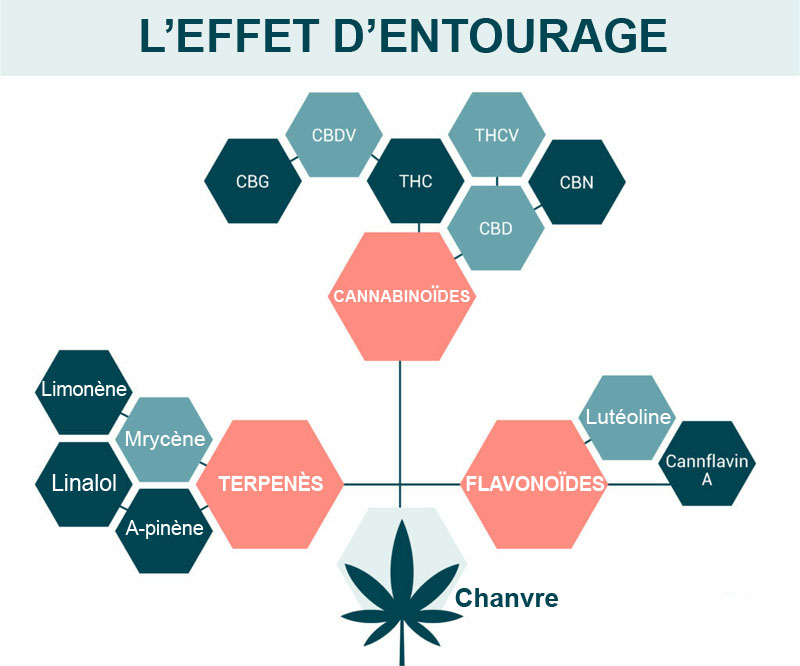
According to several studies, including a 2015 study carried out in Israel[3], when all hemp compounds are present (terpenes, cannabidnoids: CBD, CBG, CBN, THC*) they act better together than they do in isolation.
The effectiveness of cannabinoids is enhanced when they are combined: this synergy is known as the " entourage effect ".
Hemp is first heated on its own, in order to activate the cannabinoids, a process known as decarboxylation. Vegetable oil (olive or sesame oil) is then mixed in and heated to 100°C for 1 to 2 hours. Eventually, the vegetable oil evaporates, leaving behind a concentrated CBD oil.
+ This method is very popular with small-scale growers, due to its low cost.
+ Healthy extraction method.
- Hot extraction: cannabinoids may be altered and effects diminished.
- The shelf life of these CBD oils is generally quite short, so they need to be consumed quickly.
Hemp plants are soaked in a solvent, usually ethanol but also propane or butane, which chemically separates the cannabinoids. The mixture is then filtered, and using a vacuum cleaner or heat, the ethanol/solvent is purged to obtain a product highly concentrated in CBD.
+ Very inexpensive extraction method.
- Toxic residues not eliminated during evaporation may remain.
With this method, CO₂ is manipulated in such a way that it enters a supercritical state (temperature of 31 degrees and pressure in excess of 74 bar) where it possesses both the qualities of a liquid and those of a gas[4].
Without going into too much detail: the hemp passes through several pressurized chambers at very low temperatures. In the last chamber, the CO2 evaporates, leaving only a concentrate of CBD oil.
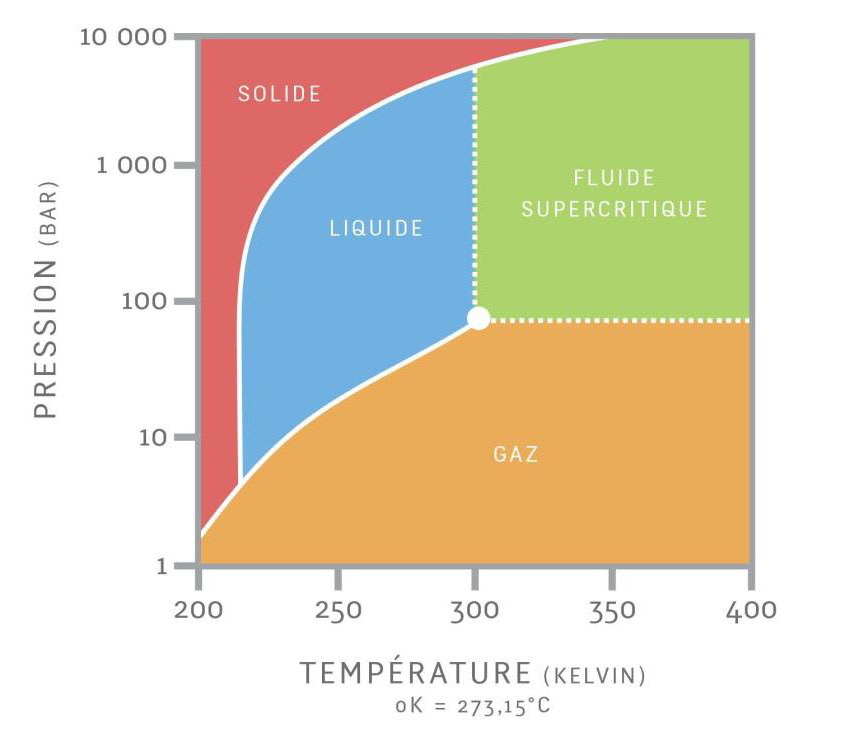
- Complex and costly industrial process.
+ Healthy method.
+ A cold extraction method that does not alter the cannabinoids.
+ Thanks to the high precision of CO2 extraction, CBD oil can be produced in precise concentrations.
+ Method for obtaining high CBD concentrations (30%, 40% or even more)
An Israeli study conducted in 2015 [3], revealed that for subjects receiving CBD isolate, this led to a bell-shaped dose-response curve. Above a certain dosage, its therapeutic impact diminished rapidly.
As you can see from the diagram below: on the curve, CBD Full Spectrum has long-lasting effects, even beyond the optimum dosage.
Finally, again in the same 2015 study: The research team also found that much larger amounts of pure CBD isolate were needed to achieve the same pain-relieving effects as full-spectrum CBD extract.
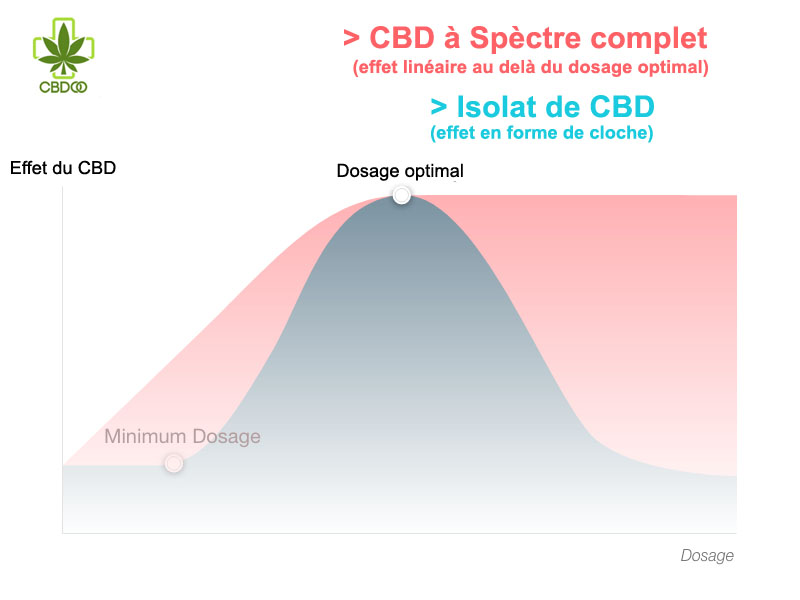
> If you'd like to know everything there is to know about dosing your CBD oil, and also which concentration to opt for (from 5% to 30% CBD), we invite you to read this article on dosing your CBD oil.
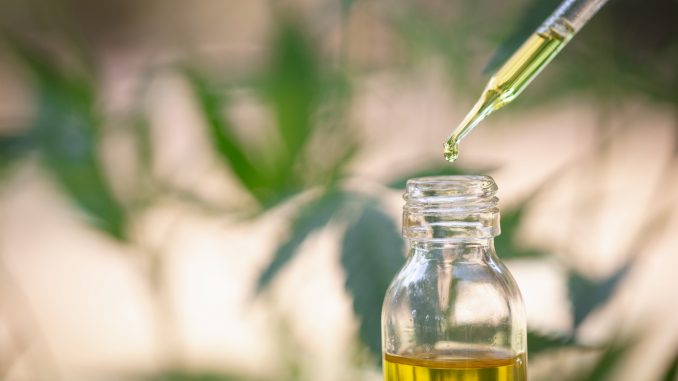
For a continuous effect, cannabidiol is generally taken 2 or 3 times a day. Simply place a few drops of cannabidiol oil directly under the tongue. This ensures rapid, effective assimilation. Although there's no risk of overdosing with CBD, we do advise you to start with the lowest CBD dose, as each person reacts differently to the substance, and then gradually increase the dose until you feel relief.